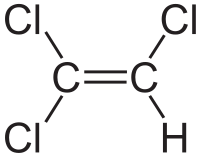
Photo from wikipedia
Proceedings: AACR Annual Meeting 2017; April 1-5, 2017; Washington, DC Evasion of apoptosis represents an essential hallmark in the progression of many cancers. The Bcl-2 family of proteins plays a… Click to show full abstract
Proceedings: AACR Annual Meeting 2017; April 1-5, 2017; Washington, DC Evasion of apoptosis represents an essential hallmark in the progression of many cancers. The Bcl-2 family of proteins plays a central role in regulating the apoptotic process. Targeting pro-survival Bcl-2 family members like Mcl-1 with small molecule inhibitors represents a viable therapeutic approach for the treatment of cancer. This study evaluated the in vitro and in vivo activity of AMG 176, a potent and selective Mcl-1 inhibitor currently in Phase I clinical development. AMG 176 binds with high affinity and selectivity to the BH3-binding groove of Mcl-1. In a cell based split-luciferase complementation assay, AMG 176 disrupted the interaction between Mcl-1 and Bak, leading to downstream activation of the intrinsic apoptosis pathway as measured by increased caspase activity and subsequent effects on viability. Oral administration of AMG 176 to mice bearing OPM-2 multiple myeloma xenografts resulted in a dose-dependent increase in activated Bak with a clear PK/PD relationship. Dosing regimens (20-60 mg/kg PO, QD) evaluating discontinuous and continuous administration of AMG 176 in established OPM2 xenografts demonstrated robust tumor growth inhibition with complete tumor regression at an elevated dose. Efficacy in this model was achieved at doses in agreement with those eliciting induction of apoptotic markers. Treatment of tumor cell lines with Compound A, a close structural analog of AMG 176, revealed a dose- and time-dependent increase in Mcl-1 protein levels that was reversible upon compound washout. Subsequent experiments performed with cycloheximide suggested that elevations in Mcl-1 protein levels were due to an increase in Mcl-1 protein half-life, likely driven by the compounds ability to disrupt proteasome-mediated degradation. Compound A was also used to characterize the kinetics of activating apoptosis. These studies revealed a rapid induction of apoptosis and loss of viability in Mcl-1 dependent multiple myeloma and AML cell lines. In cell lines highly dependent on Mcl-1, treatment with Compound A for as little as two hours was sufficient to achieve complete cell killing. Cell line profiling studies (>200 lines) revealed robust effects on cell viability in a subset of solid tumor cell lines and cell lines of hematological origin, including multiple myeloma, acute myeloid leukemia and non-Hodgkin lymphoma. Subsequent association analysis with molecular profiling endpoints identified an inverse correlation between BCLxL expression and sensitivity to Mcl-1 inhibition. Combination screens with Compound A revealed multiple highly synergistic combinations including compounds targeting the MAPK pathway, standard of care chemotherapeutics and agents targeting additional pro-survival members of the BCL-2 family. In conclusion, AMG 176 is a potent and selective Mcl-1 inhibitor, with significant in vitro and in vivo activity in Mcl-1 dependent cancer models. Citation Format: Sean R. Caenepeel, Brian Belmontes, Jan Sun, Angela Coxon, Gordon Moody, Paul E. Hughes. Preclinical evaluation of AMG 176, a novel, potent and selective Mcl-1 inhibitor with robust anti-tumor activity in Mcl-1 dependent cancer models [abstract]. In: Proceedings of the American Association for Cancer Research Annual Meeting 2017; 2017 Apr 1-5; Washington, DC. Philadelphia (PA): AACR; Cancer Res 2017;77(13 Suppl):Abstract nr 2027. doi:10.1158/1538-7445.AM2017-2027
Journal Title: Cancer Research
Year Published: 2017
Link to full text (if available)
Share on Social Media: Sign Up to like & get
recommendations!